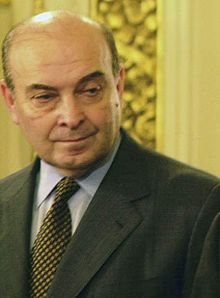Domingo Cavallo | |
|---|---|
 Cavallo in 2001 | |
| Minister of Economy | |
| In office 20 March 2001 – 20 December 2001 | |
| President | Fernando de la Rúa |
| Preceded by | Ricardo López Murphy |
| Succeeded by | Jorge Capitanich |
| In office 1 February 1991 – 6 August 1996 | |
| President | Carlos Menem |
| Preceded by | Antonio Erman González |
| Succeeded by | Roque Fernández |
| Minister of Foreign Affairs | |
| In office July 8, 1989 – January 31, 1991 | |
| President | Carlos Menem |
| Preceded by | Susana Ruiz Cerruti |
| Succeeded by | Guido di Tella |
| President of the Central Bank of Argentina | |
| In office July 2, 1982 – August 26, 1982 | |
| President | Reynaldo Bignone |
| Preceded by | Egidio Iannella |
| Succeeded by | Julio González del Solar |
| National Deputy | |
| In office December 10, 1997 – March 20, 2001 | |
| Constituency | City of Buenos Aires |
| In office December 10, 1987 – December 10, 1989 | |
| Constituency | Cordoba |
| Personal details | |
| Born | Domingo Felipe Cavallo July 21, 1946 San Francisco, Córdoba, Argentina |
| Political party | Justicialist Party (1983–1996) Action for the Republic (1996–2005) Is Possible Party (2013) |
| Spouse | Sonia Abrazián |
| Alma mater | National University of Córdoba Harvard University |
| Website | Official website |
Domingo Felipe Cavallo (born July 21, 1946) is an Argentine economist and politician. Between 1991 and 1996, he was the Minister of Economy during Carlos Menem's presidency. He is known for implementing the convertibility plan, which established a pseudo-currency board with the United States dollar and allowed the dollar to be used for legal contracts. This brought the inflation rate down from over 1,300% in 1990 to less than 20% in 1992 and nearly to zero during the rest of the 1990s.[1] He implemented pro-market reforms which included privatizations of state enterprises. Productivity per hour worked during his five-years as minister of Menem increased by more than 100%.[2] In 2001, he was the economy minister for nine months during the 1998–2002 Argentine great depression. During a bank run, he implemented a restriction on cash withdrawing, known as corralito. This was followed by the December 2001 riots in Argentina and the fall of Fernando de la Rúa as president.[3]
Cavallo is a Doctor in Economic Sciences from the National University of Córdoba and obtained his PhD in Economics from Harvard University. He received five Honoris Causa doctorates from Genoa, Turin, Bologna, Ben-Gurion and Paris Pantheon-Sorbonne universities. He was professor at the National and Catholic Universities of Córdoba, and at New York, Harvard, and Yale universities.[4]
- ^ Graciela Kaminsky; Amine Mati; Nada Choueiri (November 2009). "Thirty Years of Currency Crises in Argentina External Shocks or Domestic Fragility?" (PDF). National Bureau of Economic Research.
- ^ Cite error: The named reference
productivity1was invoked but never defined (see the help page). - ^ "Argentina's collapse - A decline without parallel". The Economist. February 28, 2002.
- ^ "Domingo Cavallo: biography". Encyclopædia Britannica.